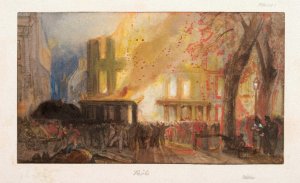Presented By: Eisenberg Institute for Historical Studies
EIHS Workshop: Burn It Down!: The Un/Making of Knowledge and Power
Megan Behrend, Robert Diaz, Dora Gao, Forrest Holden, Ian S. Moyer

Format: This is a hybrid event. Attend in person in 1014 Tisch Hall (no registration required) or stream via Zoom: https://myumi.ch/z1VQA
Nationalism uses mythology to bind together different peoples and ideals under a national identity. The mythos requires meaning-making, differentiating between acceptable and transgressive, and creating knowledge that can be passed down to maintain and sustain the national identity as canon: it is a foundation. But when the foundation of the mythology is damaged, harmful, or fabricated, the threads of knowledge passed down construct an unsustainable home. When the walls of this mythology keep and parcel out those who are, in essence, included in the floorplan of the nation, burning the house down may be the only logical form of recovery. Rather than a dissolutionary extreme, Professor Padilla Peralta and other Greco-Roman Classicists of color envision, like bell hooks, a whole new homeplace of yearning and resistance. Therefore, policy and politics of presence, not absence, define pathways forward.
This Eisenberg Institute panel features papers that interrogate disciplines and their canonical and institutional systems of knowledge in the fields of Greco-Egyptian religion, medieval England, eighteenth-century Russia, and American colonial Philippines.
Panelists:
• Megan Behrend (PhD Candidate, English Language and Literature, University of Michigan)
• Robert Diaz (PhD Student, History, University of Michigan)
• Dora Gao (PhD Student, Ancient History, University of Michigan)
• Forrest Holden (PhD Candidate, History, University of Michigan)
• Ian S. Moyer (moderator; Associate Professor, History, University of Michigan)
This event presented by the Eisenberg Institute for Historical Studies. It is made possible in part by a generous contribution from Kenneth and Frances Aftel Eisenberg.
Nationalism uses mythology to bind together different peoples and ideals under a national identity. The mythos requires meaning-making, differentiating between acceptable and transgressive, and creating knowledge that can be passed down to maintain and sustain the national identity as canon: it is a foundation. But when the foundation of the mythology is damaged, harmful, or fabricated, the threads of knowledge passed down construct an unsustainable home. When the walls of this mythology keep and parcel out those who are, in essence, included in the floorplan of the nation, burning the house down may be the only logical form of recovery. Rather than a dissolutionary extreme, Professor Padilla Peralta and other Greco-Roman Classicists of color envision, like bell hooks, a whole new homeplace of yearning and resistance. Therefore, policy and politics of presence, not absence, define pathways forward.
This Eisenberg Institute panel features papers that interrogate disciplines and their canonical and institutional systems of knowledge in the fields of Greco-Egyptian religion, medieval England, eighteenth-century Russia, and American colonial Philippines.
Panelists:
• Megan Behrend (PhD Candidate, English Language and Literature, University of Michigan)
• Robert Diaz (PhD Student, History, University of Michigan)
• Dora Gao (PhD Student, Ancient History, University of Michigan)
• Forrest Holden (PhD Candidate, History, University of Michigan)
• Ian S. Moyer (moderator; Associate Professor, History, University of Michigan)
This event presented by the Eisenberg Institute for Historical Studies. It is made possible in part by a generous contribution from Kenneth and Frances Aftel Eisenberg.